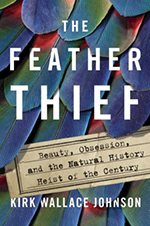15 April 2019
The Feather Thief, by Kirk Wallace Johnson
Posted by Callan Bentley
 The Feather Thief is an interesting read. Subtitled “Beauty, Obsession, and the Natural History Heist of the Century,” it’s one of those nonfiction books where the narrator starts off as a dispassionate reporter but becomes more and more involved in the story he’s reporting. Kirk Wallace Johnson is a veteran of the Iraq War who starts a nonprofit trying to help Iraqi refugees resettle in America after the war wrecks their lives. It’s stressful. He takes a weekend off to go fly fishing, and his guide mentions how a guy broke into a British nature museum in order to steal bird specimens from which to extract fly-tying feathers. Johnson becomes interested, and looks into the case. It turns out to be quite interesting: the thief is an American music student in London and something of a salmon-fly-tying prodigy. (Read a Smithsonian account of the heist here.) Some of the bird skins he steals were collected by Alfred Russel Wallace in the Malay Archipelago. He gets caught, but instead of going to prison, a one-day consultation with Simon Baron-Cohen, the celebrated psychologist (and cousin of Borat comedian Sascha Baron-Cohen) yields a diagnosis of autism, which the presiding judge uses to free him, meaning there are almost no consequences for the criminal musician. This is especially galling when you consider that he destroyed a great many of the skins, and removed their identifying labels, making them worthless for scientific study. It’s a crime against knowledge, for the sake of old white men tying fishing lures that are never intended to be actually used to catch fish – a gross perversion of decent behavior. Not only that, but he also never returned all of them: There were more than 100 birds still missing when the case was closed. The book picks up in intensity when Johnson tries to solve the case of the missing birds, and interviews key people, traveling around the world and engaging in fierce conversation with them. I won’t reveal the ending, but I found it to be a good payoff for the investment of reading the book.
The Feather Thief is an interesting read. Subtitled “Beauty, Obsession, and the Natural History Heist of the Century,” it’s one of those nonfiction books where the narrator starts off as a dispassionate reporter but becomes more and more involved in the story he’s reporting. Kirk Wallace Johnson is a veteran of the Iraq War who starts a nonprofit trying to help Iraqi refugees resettle in America after the war wrecks their lives. It’s stressful. He takes a weekend off to go fly fishing, and his guide mentions how a guy broke into a British nature museum in order to steal bird specimens from which to extract fly-tying feathers. Johnson becomes interested, and looks into the case. It turns out to be quite interesting: the thief is an American music student in London and something of a salmon-fly-tying prodigy. (Read a Smithsonian account of the heist here.) Some of the bird skins he steals were collected by Alfred Russel Wallace in the Malay Archipelago. He gets caught, but instead of going to prison, a one-day consultation with Simon Baron-Cohen, the celebrated psychologist (and cousin of Borat comedian Sascha Baron-Cohen) yields a diagnosis of autism, which the presiding judge uses to free him, meaning there are almost no consequences for the criminal musician. This is especially galling when you consider that he destroyed a great many of the skins, and removed their identifying labels, making them worthless for scientific study. It’s a crime against knowledge, for the sake of old white men tying fishing lures that are never intended to be actually used to catch fish – a gross perversion of decent behavior. Not only that, but he also never returned all of them: There were more than 100 birds still missing when the case was closed. The book picks up in intensity when Johnson tries to solve the case of the missing birds, and interviews key people, traveling around the world and engaging in fierce conversation with them. I won’t reveal the ending, but I found it to be a good payoff for the investment of reading the book.


 Callan Bentley is Associate Professor of Geology at Piedmont Virginia Community College in Charlottesville, Virginia. He is a Fellow of the Geological Society of America. For his work on this blog, the National Association of Geoscience Teachers recognized him with the James Shea Award. He has also won the Outstanding Faculty Award from the State Council on Higher Education in Virginia, and the Biggs Award for Excellence in Geoscience Teaching from the Geoscience Education Division of the Geological Society of America. In previous years, Callan served as a contributing editor at EARTH magazine, President of the Geological Society of Washington and President the Geo2YC division of NAGT.
Callan Bentley is Associate Professor of Geology at Piedmont Virginia Community College in Charlottesville, Virginia. He is a Fellow of the Geological Society of America. For his work on this blog, the National Association of Geoscience Teachers recognized him with the James Shea Award. He has also won the Outstanding Faculty Award from the State Council on Higher Education in Virginia, and the Biggs Award for Excellence in Geoscience Teaching from the Geoscience Education Division of the Geological Society of America. In previous years, Callan served as a contributing editor at EARTH magazine, President of the Geological Society of Washington and President the Geo2YC division of NAGT.